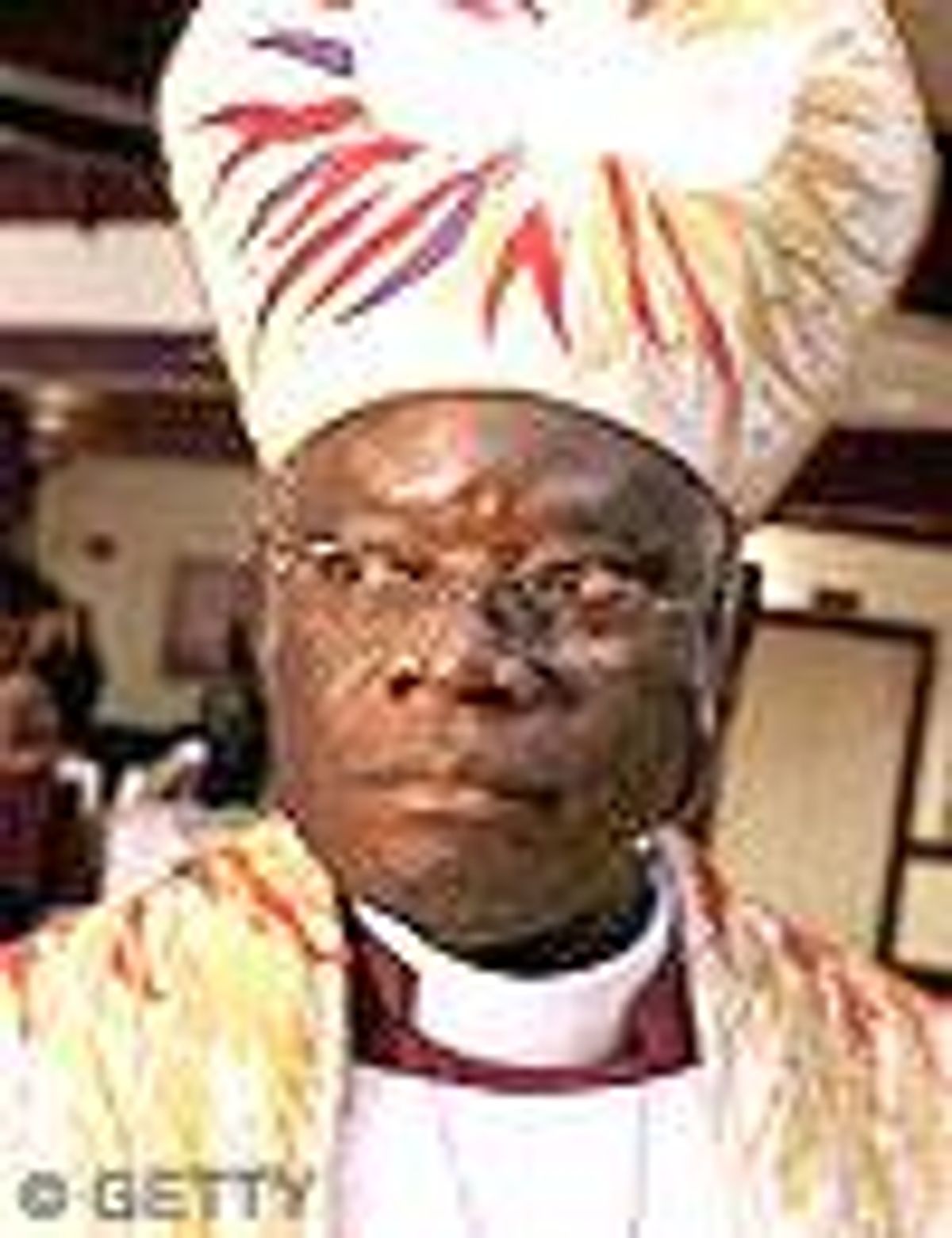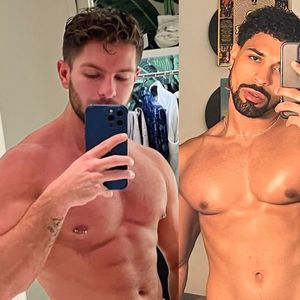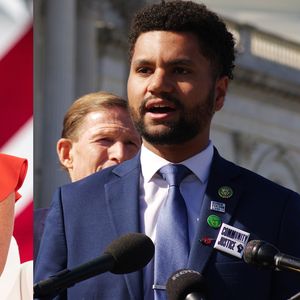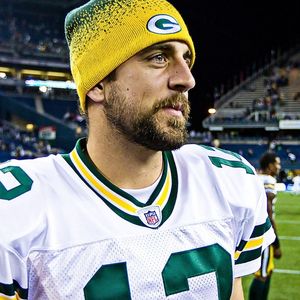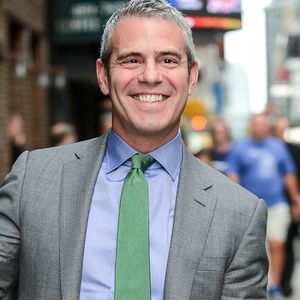The pews of
Hylton Memorial Chapel in Woodbridge, Va., were alive with
the spirit of an authentic revival on May 5. Alternately
dancing, raising hands to the heavens, and bowing in
prayer, roughly 1,500 worshippers witnessed the
marriage between the Church of Nigeria and the recently
formed Convocation of Anglicans in North America (CANA), a
group of about 30 Anglican congregations scattered
about the United States that have formally broken away
from the Anglican Communion's American branch, the
Episcopal Church USA.
Peter Akinola,
the archbishop of Nigeria, had come to Virginia to preside
over the installation of the convocation's leader,
Bishop Martyn Minns. Decked out in a regal gold robe
and miter, Archbishop Akinola exited the sanctuary at
the end of the ceremony smiling, jubilant--singing the
words of the recessional with his entourage of 10 or
so trailing behind. For a gay reporter covering the
event, it was a rare glimpse--a chance
encounter--and I found myself fixated, studying him in
not so subtle a way. He spotted me within moments. I
clearly wasn't there to celebrate. His smile
dropped, his song fell away, and he walked on by.
The union between
Peter Akinola and Martyn Minns was inaugurated in the
summer of 2003 when a majority of 107 Episcopal bishops
voted to approve the consecration of
V. Gene Robinson,
an openly gay man, as bishop of New Hampshire. Leading
up to the vote, a growing number of evangelically inspired
Episcopal conservatives had been voicing their
displeasure with the direction of the Episcopal
Church, but few as loudly as the congregation of Truro
Church in Fairfax, Va., headed by then-Rev. Minns.
Seven leading bishops from Asia, Africa, and Australia
met with Minns and about 50 conservative Episcopal
bishops in Fairfax and issued a statement saying
Robinson's confirmation could
"precipitate a dramatic realignment of the
church." After Robinson's installation,
Akinola officially cut ties with the Episcopal Church,
stopped accepting its donations, and, in a 2006
ceremony held in Nigeria, elevated Minns to the rank of
missionary bishop.
With
Minns's formal installation as leader of CANA on May
5, Archbishop Akinola effectively expanded his
church's authority into the United States, with
Minns as his American brand manager.
Akinola must have
felt a strong calling to make such a move. It put him
in defiance of a church tradition, dating back to the fourth
century, that limits the activity of a bishop to that
bishop's jurisdiction. Put simply: One bishop
doesn't tread on another bishop's turf.
Virginia is the turf of Bishop Peter Lee, and the
United States is the domain of Presiding Bishop
Katharine Jefferts Schori, the first female primate, or
leader, of the Episcopal Church and in the worldwide
Anglican Communion.
Bishop Schori
referenced that tradition in a last-minute letter to
Akinola on April 30, urging the archbishop to change his
plans. She added that his visit would hurt
"efforts of reconciliation" between the
Episcopal Church and the Anglican Communion, the body that
delicately knits together about 77 million Anglicans
in 38 provinces across 164 countries. It's a
network that is set up to absorb the unique cultures of
different regions by allowing them to elect their own
bishops without interference from abroad.
The leader of the
Anglican Communion, Archbishop Rowan Williams of
Canterbury, joined Schori in opposing Akinola's
visit--to no avail.
The Nigerian
primate wrote Schori that due to what he called the
"unbiblical agenda'' of the Episcopal Church,
"'the usual protocol and permissions are no
longer applicable."
His words depict
a leader who is secure in the purity of his agenda. Yet
as I began to ask questions about this stern spiritual icon,
I discovered an all-too-fallible man who has found
that condemning gay people is a shrewd career move.
It would be wrong
to call Akinola unprincipled. No doubt he, like most
Nigerians, grew up believing that homosexuality is a sin.
But this pastor has let his flock at home suffer while
he networks in America, accumulating power, publicity,
and--according to informed observers--money.
Nigeria, with
about 120 million people, is the most populous country in
Africa and among the poorest in the world. Life expectancy
is 47 years, roughly 3 million people are infected
with HIV, and between 1996 and 2005, nearly 30% of
children under age 5 were malnourished. It is a land
of dichotomies, where oil flows at about 2.5 million barrels
a day--making Nigeria the largest oil producer
in Africa--and yet anywhere from 60% to 75% of
Nigerians, according to various sources, live on less than a
dollar a day.
Nigeria is also
the largest Anglican province in Africa, with more than
15 million members. As one of the most powerful leaders in
the religion, Archbishop Akinola is also perhaps
Africa's staunchest opponent of gay rights, the
ordination of gays and lesbians, and same-sex unions. And
his reach goes far beyond the church.
Akinola is a
political power player. He strongly backs a proposed
Nigerian law, currently under debate, that would prohibit
same-sex marriage and call for a five-year
imprisonment of anyone who enters into a same-sex
marriage or "performs, witnesses, aids, or
abets" a such a marriage. The bill even
specifies that anyone involved in advocacy for gay and
lesbian rights would get five years behind bars.
International human rights groups, experts from the
United Nations, and more than 250 U.S. Christian
leaders have condemned the measure.
The human cost of
Akinola's vendetta in his homeland should not go
unnoticed by LGBT Americans watching his rise here.
"Archbishop Akinola is exposing gays and
lesbians in Nigeria to danger," says Davis
Mac-Iyalla, director of the pro-LGBT Anglican group Changing
Attitude Nigeria. "He's constantly
putting us on the news and saying that homosexuality
is evil, thereby making some people take the law into their
hands."
Mac-Iyalla
founded Changing Attitude Nigeria, which is part of an
international network of Changing Attitude groups, in 2005.
Today, the Nigerian group has about 2,000 registered
members. But with the current climate in Nigeria, many
gay people are afraid to come out. If a conservative
estimate of roughly 4% of Nigeria's citizens were
gay, that would mean about 5,000,000 gays and lesbians
reside there; the comparable figure for the United
States is about 12 million.
"We have
been part of the community," says Mac-Iyalla,
explaining that homosexuality has come under great
scrutiny in Nigeria only in the past few years.
"It is only now that the government and the church
have decided to use us to its political gain."
The result? "Most people get themselves
married, but they still know that they are gay or they are
lesbians."
In 2005,
Mac-Iyalla and eight other members of his group were
arrested after a meeting in the nation's
capital, Abuja. They were beaten and held in jail
without food or water for three days. Mac-Iyalla has also
received threatening e-mails and phone calls as well as one
handwritten letter that spoke of torturing him with
acid.
"It
frightens me, although it will not make me stop,"
says Mac-Iyalla, who now lives in exile in nearby
Togo. "Those who are doing this are Christians
and members of the church--they think they are working
for God by getting rid of me."
Mac-Iyalla says
that most Nigerians see homosexuality as abnormal and
unnatural, which makes it easy for Akinola to push his
agenda. The cultural divide between the United States
and Africa on this issue is so extreme that, in the
words of one African who spoke on the condition of
anonymity, "The people in the pews in most Anglican
churches in Africa, I don't even really think they
understand the battle their leaders are
fighting."
Gloria Kwashi,
the wife of Bishop Benjamin Kwashi of Nigeria's Jos
diocese, an Akinola ally, put it this way at Minns's
installation in Virginia: "The little I know
about that thing is that we have them in Nigeria. But
we don't talk about it. It's not something to
talk about."
And yet
that's exactly what Akinola keeps talking about.
Around the time he won an award from the online
religious publication Kairos Journal in
2005--which included a $25,000 grant--for
exhibiting "exemplary fidelity to the authority
of Scripture and exceptional pastoral courage,"
Akinola issued an essay that proclaimed,
"Homosexuality and lesbianism, like divorce,
breed a society of single parents which gives rise to a
generation of bastards."
While Akinola
passes such judgments, his fellow Africans struggle with
poverty and disease. "We debate these things whilst
people are dying," says Bishop Musonda Trevor
Selwyn Mwamba of Botswana.
"[Akinola's] voice has been the icon of the
conservative position," says Mwamba.
"[But] Africa is not a monochrome continent. His is
the voice that has been given publicity, but it is not
the dominant voice.
"The voice
which is not heard," Mwamba continues, "and
this is what I would call the real voice of the
Anglican Africans, is a silent voice, which simply
seeks to live its Christian values without drawing attention
to itself. It's a voice of trying to make ends
meet."
Mwamba sees the
real issues of the African people--poverty, the lack
of clean drinking water, nutrition, HIV and AIDS,
education, women's rights--being
neglected by the small cadre of bishops led by Akinola.
"Thousands of kids are dying every day,"
Mwamba says. "Now, those are the issues the
church should be addressing."
For Akinola,
though, rejecting gays takes priority. After he cut off ties
with the Episcopal Church, he refused to take its relief and
assistance money, not only for Nigeria but also for
the entire 13 provinces that form the Council of
Anglican Provinces in Africa (CAPA), of which he is
chairman.
Reverend Emmanuel
Sserwadda, the Episcopal Church's U.S.-based
partnership officer for Africa, says Akinola has crippled
the church's efforts to provide aid in Africa.
"In our
annual budget we put line items to assist provinces,
especially in Africa," says Sserwadda, who was
born, educated, and ordained in Uganda. "[But]
in the last three years [CAPA] has been doing nothing
because one person, Akinola, has hijacked the whole
thing."
Akinola has not
blocked all American aid from coming into Africa. Money
from his conservative allies still flows. For instance, Five
Talents, an organization cofounded by Minns, makes
micro loans to budding entrepreneurs in Africa.
Still, in the
face of so much need, Bishop Mwamba sees no reason to
reject any offerings of aid to Africa. And at any rate, he
adds, Archbishop Akinola should not be acting
autonomously. "The church is not just comprised
of the archbishop," says Mwamba. "Decisions
have to be taken in consideration of all the bodies
that constitute the church."
Mwamba's
diocese, which does accept funding from the Episcopal
Church, is building the first inpatient hospice in
Botswana; it also runs Holy Cross Hospice, which
provides outpatient services for people living with HIV or
AIDS, their families and caregivers, and orphans and
vulnerable children.
"To see
little children smiling because somebody is caring and
loving and showing them some hope by being
there--these things you cannot measure, they
bring great joy," says Mwamba.
Akinola may get
joy from preaching his beliefs. But he gets earthly
rewards as well. Both Mwamba and Sserwadda say that Akinola
and other bishops have been lured away from addressing
key African issues by the promise of power and money.
"Most of
the influence has been done by people from [the United
States] like Martyn Minns, like Bishop [Robert] Duncan
from Pittsburgh--that group of people,"
says Sserwadda, referring to the two of the better-known
conservative Anglicans in America. "Akinola
wouldn't be meddling in the issues of the
Episcopal Church had these people not reached out to him.
He wouldn't have a platform [in America]."
The
"influence" Sserwadda describes comes in the
form of all-expenses-paid trips to the United States,
envelopes that contain several hundred to several
thousand dollars--gifts big enough to be
meaningful for one person but too small to have serious
impact on an entire ministry. The money is nearly
impossible to track because it isn't linked to
any specific organization.
"If an
American gives an envelope like that, it is not given for
the use of the church, it is given to the
individual," says Sserwadda. "Or if not
that, someone is flown into the States, and all his bills
are paid.... He goes back after doing shopping,
and sometimes that person comes with his wife or with
his child...." In other words, it's a
cushy family trip for free.
For U.S.
executives, such perks may be common, but by African
standards, they are rich. Says Sserwadda: "I am
telling you that even [a bishop's] annual
salary cannot facilitate" travel on such a scale.
Sserwadda has not
personally witnessed an exchange of money, he says.
"But we hear of it," he adds. "It has
been happening."
"The money
is flowing, definitely, left, right, and center,"
agrees Mwamba. "I think there is great
temptation among poorer African bishops who may be
promised whatever they may be promised, if they take a
certain position."
For a leader like
Akinola, the greatest lure of all may be the chance to
play on a world stage. "It is the power
issue," Sserwadda says. "He enjoys
it."
The problem,
explains Sserwadda, is that Akinola's African flock
is disempowered. "When you corrupt a leader,
then that means you really deny everything to the
people under that person," he says, "because
they can't oppose him or her."
One anonymous
source who is African-born but now works as an Episcopal
minister in the United States sees the whole African crusade
against homosexuality as someone else's war.
"For me,
the primates in Africa are mercenaries who have been hired
to fight a war, which in the U.S. they have
lost," he says, adding that Robinson's
consecration was the final straw. "If you are losing
a battle, if you don't have enough manpower to
fight, you go and hire mercenaries from somewhere who
can fight for you."
Bishop Mwamba
concurs: "To a great degree Africa has always been
the play field of different powers. The whole issue of
sexuality is an American issue that somehow has found
itself being played out across the Atlantic in an
African conference."
As Minns wrote in
the program for his installation ceremony, "There is
a delightful irony in that a church that was founded
by missionary efforts from the west is now able to
return the blessing to the west."
Of course, that
"blessing" means that CANA is now competing to
supplant the Episcopal Church as the American arm of
the Anglican Communion. It's an effort that
Akinola sees as a long-term endeavor, calling Minns's
installation "the first step" in a long
journey. "We do this on behalf of the Anglican
Communion," he said from the stage in Virginia, his
words ringing righteous as ever. "We are here
to ensure that God's people have a
home."
